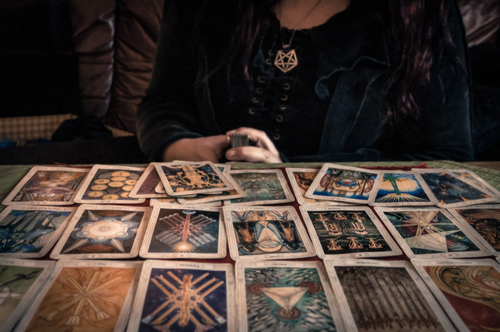How my childhood interest in the supernatural bloomed in quarantine
My grandfather has this hall of books. There are books on saints, psychology, and the paranormal. These are things I’ve always been deeply interested in.
He had this one encyclopedic book that talked about ghosts, astrology, UFOs, and psychic experiments. Whenever we’d visit his house, I’d spend my afternoons reading and rereading the articles. I think, like many Filipino families, my family’s spirituality is experienced as a part of reality.
In other words, there are always stories of people seeing angels, demons, and Marian apparitions. We have a faith healer in our family, and a few priests. I’ve seen people go into trance and speak in tongues. I’ve been warned by priests to avoid meditation because when you empty your mind, it opens it up for demons to enter and possess you. They really take it seriously.
I feel like we Filipinos are deeply spiritual because we intuitively understand that there are things around us that we don’t see, and things that happen that can be clearly explained through our mythology. I’m sure most of us know a faith healer.
Maybe you know someone who was taken to an albularyo for a strange illness that the doctors couldn’t figure out. Maybe you even own an agimat, and you just don’t realize that it is one. We do so many spiritual things, merging all kinds of faiths. For example, a person can be Christian yet still believe in kulam.

I’m not saying that all of this is true. I’m not saying there are spirits around us and dangerous woo woo we can’t control. What I am saying is that these things are experienced as a reality, and so therefore must be real in a way. Of course, anecdotes are not science.
Then again, if something exists in nature, it will, eventually, be made public. So, we can agree that these strange spiritual things exist—it’s only a matter of interpreting the phenomena.
Growing up, I saw and heard so many weird stories. Going into college, I found out that these things can be studied. The founder of the psychology department of the Ateneo, Fr. Bu, studied duwendes and spiritual possessions, but he grounded it with the cool distance of psychology.
In his office, there are tools to access the unconscious mind: tarot cards, crystal balls, and dowsing rods. They don’t hold any special magic on their own, but when used by a discerning practitioner, they can be helpful in accessing that part of our mind that talks in dream images. Sometimes we act in ways we don’t understand, maybe we say things we don’t mean, or suddenly remember things that make us cringe. That’s the unconscious mind. Using magical tools as metaphorical prompts, we are able to enter into that psychic space.
I know this is pretty unconventional. I know that it makes a lot of people feel uncomfortable. Honestly it kind of scares me too, but I can’t deny the things I’ve seen and experienced. It has only been a passing hobby for me until last year, when the pandemic hit and we were all looking for passions to pursue.
Since I’ve always been attracted to this, I delved deeper. I made an account just for my strange interests, where I “study” the occult through psychology, walking the path of people like Carl Jung and Fr. Bu. (The account on Instagram is @occultpsychology.)
I read and post about what I’ve read. I look for studies on the paranormal. At one point, a tarot reader followed me and I followed back. We started talking about our similar interests and they introduced me to a whole community of passionate people.
Tarot reading was my entry point into this magical world. In the past year I’ve made friends with psychics, witches, and crystal healers. I’ve also met people in the field of psychology who study the occult as a metaphor for psychological processes.
Many of the practitioners I’ve met do something called “shadow work,” which at first I thought was black magic but was, in fact, working through your own traumas and insecurities. Some of them use tarot cards as prompts for self-reflection. The shadow is an archetype, a symbol of our own inner darkness. Many of the practitioners I’ve met are on a genuine path of spiritual self-discovery. Many of them are mental health advocates who are open about going to therapy.
Now I own seven tarot decks and seven crystals. I’ve had time to read so many interesting books. I’ve even read tarot for my friends, for fun. Though I am very interested, I am also very skeptical. I have my doubts about astrology, I think spirits are projections of psychic disturbances, and I don’t believe that the cards can predict the future. Also, if you’re going through something serious, and if you can afford it, go to a licensed mental health professional! But, if you’re just casually interested, there’s no harm in listening to the old stories.
You might start to remember the magic you’ve known as a child. You might realize that these things aren’t that strange after all.


